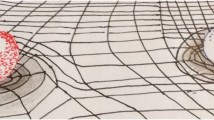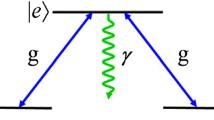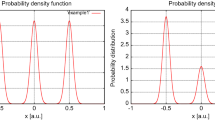Abstract
The thermodynamic influence of quantum probing on an object is studied. Here, quantum probing is understood to be a pre-measurement based on a non-demolition interaction, which records some information of the probed object but does not change its energy state when both the probing apparatus and the probed object are isolated from the environment. It is argued that when the probing apparatus and the probed object are immersed in the same equilibrium environment, the probing can affect the effective temperature of the object or induce a quantum isothermal process for the object to transfer its energy. This thermodynamic feature can be regarded as a witness of quantum probing.
Similar content being viewed by others
References
Landauer R. Irreversibility and heat generation in the computing process. IBM J Res Dev, 1961, 5: 183–191
Leff H S, Rex A F. Maxwell’s Demon 2: Entropy, Classical and Quantum Information, Computing. London: Institute of Physics Publishing, 2003
Zurek W H. Decoherence, einselection, and the quantum origins of the classical. Rev Mod Phys, 2003, 75: 715–775
Braginsky V B, Khalili F Y. Quantum Measurement. New York: Camebridge University Press, 1992
Sun C P. Quantum dynamical model for wave-function reduction in classical and macroscopic limits. Phys Rev A, 1993, 48: 898–906
Dong H, Yang S, Liu X F, et al. Quantum thermalization with couplings. Phys Rev A, 2007, 76: 044104
Quan H T, Zhang P, Sun C P. Quantum-classical transition of photon-Carnot engine induced by quantum decoherence. Phys Rev E, 2006, 73: 036122
Fröhlich H. Theory of the superconducting state I. The ground state at the absolute zero of temperature. Phys Rev, 1950, 79: 845–856
Nakajima S. Perturbation theory in statistical mechanics. Adv Phys, 1953, 4: 363–380
Quan H T, Zhang P, Sun C P. Quantum heat engine with multilevel quantum systems. Phys Rev E, 2005, 72: 056110
Quan H T, Liu Y X, Sun C P, et al. Quantum thermodynamic cycles and quantum heat engines. Phys Rev E, 2007, 76: 031105
Quan H T. Quantum thermodynamic cycles and quantum heat engines II. Phys Rev E, 2009, 79: 041129
Caldeira A O, Leggett A J. Quantum tunnelling in a dissipative system. Ann Phys, 1983, 149: 374–456
Leggett A J, Chakravarty S, Dorsey A T, et al. Dynamics of the dissipative two-state system. Rev Mod Phys, 1987, 59: 1–85
Sun C P, Zhan H, Liu X F. Decoherence and relevant universality in quantum algorithms via a dynamic theory for quantum measurement. Phys Rev A, 1998, 58: 1810–1821
Zanardi P, Quan H T, Wang X, et al. Mixed-state fidelity and quantum criticality at finite temperature. Phys Rev A, 2007, 75: 032109
Author information
Authors and Affiliations
Corresponding author
About this article
Cite this article
Dong, H., Liu, X. & Sun, C. Thermodynamic witness of quantum probing. Chin. Sci. Bull. 55, 3256–3260 (2010). https://doi.org/10.1007/s11434-010-4094-3
Received:
Accepted:
Published:
Issue Date:
DOI: https://doi.org/10.1007/s11434-010-4094-3




